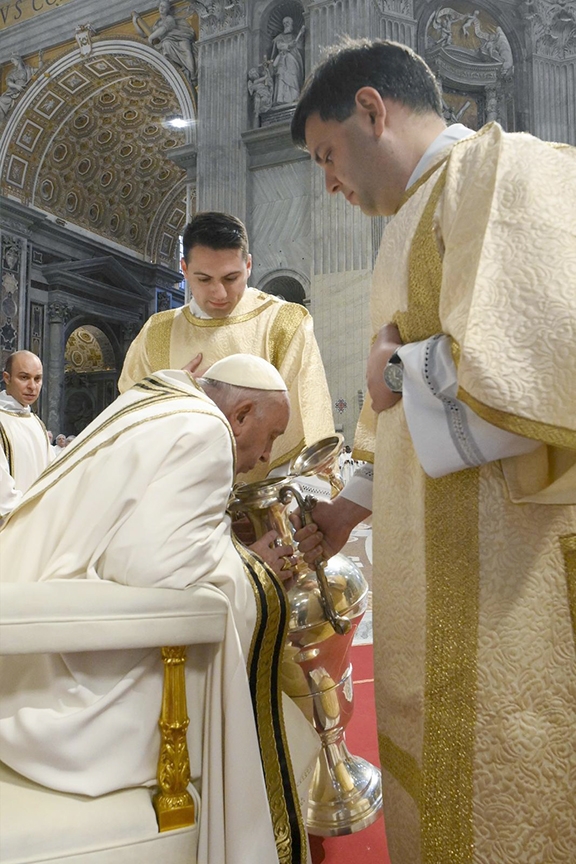
VATICAN CITY. Priests “anointed” by the Holy Spirit should be authentic agents of harmony rather than “instruments of division,” Pope Francis said.
Celebrating the Chrism Mass in St. Peter’s Basilica April 6, the pope addressed his homily to about 1,800 concelebrating priests in the basilica on what he called “the birthday of the priesthood,” the institution of the Eucharist that is celebrated on Holy Thursday.
Building harmony is not only a way of improving the Church or being polite, Pope Francis told them, but “an intrinsic demand of the life of the Spirit.”
“If others see in us people who are dissatisfied and discontented, who criticize and point fingers, where else will they find harmony?” asked the pope. “How many people fail to approach us, or keep at a distance, because in the Church they feel unwelcomed and unloved, regarded with suspicion and judged?”
“In God’s name, let us be welcoming and forgiving, always,” he said.
Pope Francis presided over the Chrism Mass, named after the oils blessed during the liturgy, but the principal concelebrants at the altar were: Cardinals Angelo De Donatis, the pope’s vicar for Rome; Giovanni Battista Re, dean of the College of Cardinals; Leonardo Sandri, vice dean; Francis Arinze, the third-ranking cardinal; and Auxiliary Bishop Baldassare Reina of Rome.
After the homily, the priests renewed the promises made to their bishop at their ordination. Deacons then wheeled large silver urns down the center aisle of St. Peter’s Basilica to receive the pope’s blessing. The oils will be distributed to Rome parishes and used for the sacraments of baptism, confirmation, ordination, and the anointing of the sick in the coming year.
Following tradition, Pope Francis breathed on the chrism oil to symbolize the infusion of the Holy Spirit, though he did not stand over the urn as in past years – the massive container was brought to his chair, and he remained seated as he continues to experience knee pain.
While thousands of laypeople were in attendance, Pope Francis discussed the problems priests and bishops face in their vocations and encouraged them to look to the Holy Spirit to embrace their calling in times of doubt.
“Sooner or later, we all experience disappointment, frustration and our own weakness; our ideals seem to recede in the face of reality, a certain force of habit takes over, and difficulties that once seemed unimaginable appear to challenge our fidelity,” said the pope.
In this “watershed” moment, he said, priests may either “drift toward mediocrity and settle for a dreary routine” or be reinvigorated by the Holy Spirit.
“Priestly maturity comes from the Holy Spirit,” he said. “Our priesthood does not grow by quick fixes but an overflow of grace.”
Setting aside his prepared text, Pope Francis shared that he was thinking of priests “in crisis, who are disoriented and don’t know how to take back up the way of the anointment of the Spirit.”
“To these brothers, I am thinking of you, and I simply say, have courage, the Lord is greater than your weaknesses, than your sins, entrust yourself to the Lord,” the pope said. “A double life won’t help you, nor will tossing everything out the window. Look ahead and let yourself be caressed by the anointing of the Holy Spirit.”
Welcoming the Spirit into one’s life “happens when we admit the reality of our own weakness,” he said.
Priests, he said, should be honest and ask themselves, “Does my fulfilment depend on my abilities, my position, the compliments I receive, my promotions, the respect of my superiors or coworkers, the comforts with which I surround myself? Or on the anointing that spreads its fragrance everywhere in my life?”
Spiritual life becomes “liberating and joyful once we are no longer concerned to save appearances and make quick fixes,” said the pope.
He ended his homily with two “simple and important words” for the priests: “Thank you.”
“Thank you for your ministry, which often is carried out with great effort and little recognition,” he said, before praying that they would be “apostles of harmony.”









